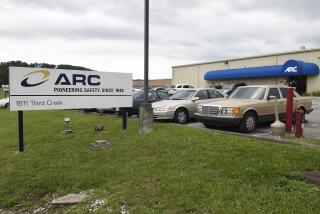Ford Has a Lot Riding on Response to Recall
- Share via
DETROIT — The recall of millions of Firestone tires has not only sullied the tire maker’s name, it has also tarnished the image of Ford Motor Co. and focused attention on the safety of the auto maker’s Explorer, the country’s top-selling sport-utility vehicle.
Ford is generally praised by analysts and marketing experts for a rapid and forthright response to the recall, which was announced Aug. 9 in response to reports of accidents in which the treads of Explorer tires came whipping off at high speed, sending vehicles out of control. But unanswered questions continue to dog Ford about what the auto giant knew, and when.
The 6.5-million suspect tires were fitted almost exclusively on new Explorers, which have generated about $13 billion in sales each of the last two years. The National Highway Traffic Safety Administration is investigating at least 54 deaths linked to Firestone-brand tires. And with the number of SUVs in the U.S. market expected to skyrocket from 43 models last year to more than 80 in 2004, Ford needs every edge it can get to maintain the Explorer’s lead.
“There’s no question Ford reacted quickly. Of course, they’re dealing with their cash-cow vehicle,” said Joan Claybrook, president of consumer advocate group Public Citizen and NHTSA’s administrator from 1977 to 1981.
Bridgestone/Firestone Inc. was sued as early as 1993 over tread separation, says Claybrook, who accuses the tire maker and automotive partner Ford of covering up what they knew about dangerous tires.
“There were enough lawsuits that they knew there was something seriously wrong,” she said.
Taras Kick, a downtown Los Angeles attorney who is preparing five lawsuits against Firestone and Ford for tire-related accidents, is convinced as well.
“The reality is that this has been going on for years,” said Kick, who expects a sharp rise in the number of accidents that come to light because of worldwide publicity over the issue. “Ford knew about it.”
Such accusations are “absolutely not true,” said Ken Zino, a senior Ford spokesman. “There have been just a few minor lawsuits and not on a basis where we could do a statistical engineering analysis. Some of our current critics are looking for more lawsuits; we’re looking for solutions.”
One issue that nags is that of tire pressure; Ford says it recommends 26 to 30 pounds per square inch, while Firestone recommends 30 psi. But Tom Tokar of Tommy’s Firestone Auto Repair in Novi, a Detroit suburb, is incredulous. He pointed to the 35 psi indicated directly on a Firestone Wilderness AT tire, then pulled open the door of an Explorer whose tires he had just replaced. The label said simply 26 psi.
“You pull a 30-foot boat, put four kids in, put on a luggage rack--there’s no way you can drive that at 26 psi,” said Tokar, whose phone has been ringing off the hook all week with Ford dealers seeking replacement tires--at retail cost.
“Dealers will spend a little more so they can have what people want: an Explorer with Goodyear tires,” said Tokar, who had sold 2,800 tires by midafternoon Friday.
In response to such critics, Ford has attempted to send messages pointing to the tires, not the truck. Auto makers are understandably loath to link their vehicles in any way to traffic deaths, but Ford volunteered this week that the Explorer has been involved in 28% fewer fatalities than similar SUVs.
Ford also noted that from 1995 to 1997 it built about 500,000 Explorers equipped with Goodyear tires similar to the Firestones that were recalled, but those trucks experienced no tread separation.
Nevertheless, the Explorer’s involvement in the tire recall is the latest challenge the auto maker has faced in protecting its image:
* When an explosion at a Ford plant in February 1999 killed six, newly appointed Chairman William Clay Ford Jr. cut short meetings and rushed to the scene, expressing sympathy and winning plaudits for his family’s firm as a caring, charitable corporation.
* Twice this year, Ford extended warranties on more than 1 million vehicles that use a line of V-6 engines prone to head gasket failure--but only after intense lobbying by consumer advocates and growing customer complaints that the company had not acted quickly enough.
Even as consumer complaints continue--Ford will warranty only certain models and years of vehicles involved--at least one expert saw the response as indicative of management’s greater commitment to customer satisfaction--and, perhaps, the bonuses tied to it.
“The head gasket response was very consistent with the new image they’re portraying,” said Brian Wansink, professor of marketing at the University of Illinois in Urbana. “What it’s actually doing is positioning the brand as more responsive.”
* Earlier this month, General Motors Corp. Vice Chairman Harry Pearce publicly lambasted Ford for announcing that its trucks would gain 25% in fuel efficiency by 2005. Pearce accused Ford of hoodwinking the public by attempting to paint itself as the “greenest” of the U.S. auto makers, noting that GM’s truck fleet rates higher in fuel economy.
Now, being so closely linked to the Firestone recall, Ford risks another black eye.
Nonetheless, experts see less danger of lasting damage to Ford than to Firestone--although the auto maker’s share price had taken a dip in the last week before closing up 69 cents on Friday to $27.75 on the New York Stock Exchange.
“The rub-off is not damaging to Ford at this point, but if the crisis lingers and tires do not get replaced fast enough, people will hold Ford responsible,” said Rajeev Batra, a professor and brand management expert at the University of Michigan.
Indeed, says auto analyst David Healy of Burnham Securities, the tire failures were relatively rare, and though the crisis broke just as Ford was unveiling a totally new generation of Explorer due next year, “by the time the new Explorer comes out, I think the whole thing will be forgotten,” Healy said.
Meantime Friday, Bridgestone/Firestone’s problems were compounded when its 8,000 unionized workers said they will terminate a temporary contract within 14 days, setting the stage for a possible strike at all nine U.S. plants if negotiations fail during that time.
* REFORMS URGED
National Highway Traffic Safety Administration faces criticism. A1






